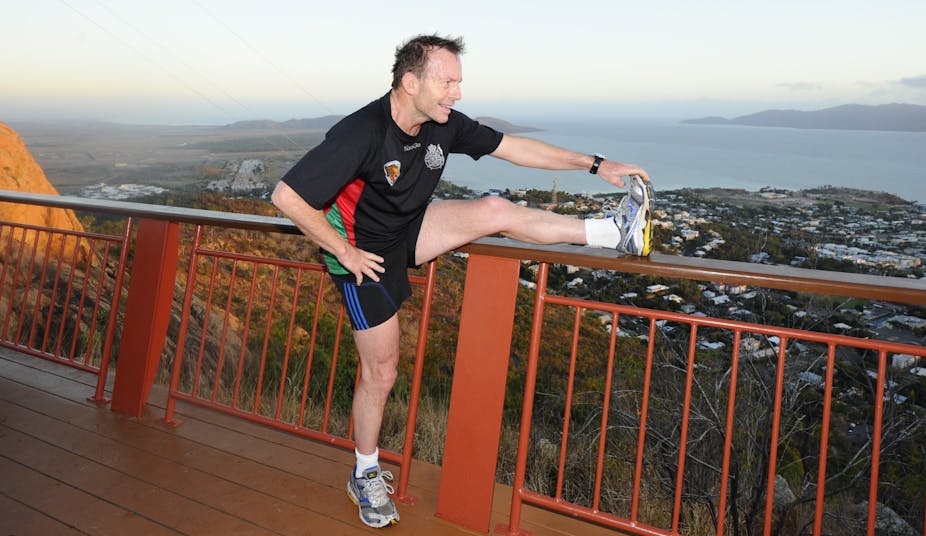Kevin Rudd would have to dramatically change the game in this last campaign week to alter a result that the latest Newspoll suggests is now virtually determined.
The poll in The Australian shows Labor’s position has deteriorated further, with the primary vote crashing to 33%, the ALP now trailing 46-54% in two party terms (compared with 47-53% a week ago) and Tony Abbott overtaking Rudd as preferred PM for the first time (43-41%).
Dissatisfaction with Rudd jumped by six points in the weekend poll, which was taken after senior bureaucrats dealt the ALP a big blow by distancing themselves from the government’s claims of a big hole in Coalition savings numbers.
Rudd would have to convince voters that Abbott is simply too much of a risk, as well as persuade them that Labor should be given another chance. So far, he has had no success in doing either.
In these last days Abbott has to avoid anything going badly wrong. His biggest challenge is to make sure that the final costings that he produces stand up to scrutiny. He is trying to minimise danger by leaving these as late as possible. They are expected out on Thursday, after the advertising blackout.
The Coalition will release some more savings that week, but Abbott said at the weekend they would not “impact on ordinary Australians.”
The Coalition claims it can’t put out all the costings until it has released all its policies. Abbott said Sunday on ABC’s Insiders: “we can’t give you any final figures until we have given you our final policy initiatives and we will be making… new policy initiatives right up until the middle of the week.”
This is simply an excuse to dodge scrutiny as long as possible, delaying the opportunity for Labor and analysts to effectively pick apart the figures. Despite constant government and media pressure, the Coalition seems in a solid enough position to get away with the tactic.
Rudd has been assuring the party faithful that he is not giving up the fight and maintains, regardless of the polls, that the battle is not lost. A few days ago, when he addressed party workers in Melbourne he recalled the late turnarounds in the 1993 election and in the campaign when Anna Bligh won in Queensland.
But it appears to be now a question of attempting to minimise its losses.
Rudd’s theme this week will continue to be jobs, jobs, jobs - what Labor has done for jobs, what it will do if reelected and how Abbott will destroy them.
Behind the scenes, the thoughts of both sides this week will be turning to what happens post-election.
Abbott is keen not to give the impression that he thinks victory is assured. But he also now is talking as someone who knows he is on the threshold of power - he is anxious to send the message that he is up to the job.
He said on the ABC: “Well… you absolutely take nothing for granted. Every day for the next week I will talk about my possible plans, versus more of the same from the Labor party,” but he also said: “I’m ready for the responsibilities of the highest office, including foreign responsibilities.”
His team will be working on its plans for transition to government, as Abbott readies to put a ministry together and start the policy initiatives which he has promised from day one. Though the early days of government always seem heady, mistakes made in the first weeks can be costly, so careful preparation is vital.
On Labor’s side, the post-election period could be worse than a defeat that comes after more normal circumstances. But much would depend on the size of a loss. If Rudd managed to pull back numbers in these final days, people would think that it would have been much worse under Julia Gillard. But if a large swathe of seats was lost and senior figures such as Chris Bowen were swept away, then the post mortem would be very ugly.
Rudd cannot complain of disloyalty in this campaign. Gillard has done nothing to disrupt his efforts, nor have her supporters. The situation has been helped by the fact that she and a number of key loyalists are leaving politics. Nevertheless, the contrast with the behaviour of the Rudd camp in 2010 is stark.
A defeated Labor Party would face a difficult rebuild. Most immediately, it would presumably have to find a new leader. Rudd (assuming he won his seat, which is likely) would not, one would think, remain in the job. The caucus has also agreed to a whole new process, under which the leader would be chosen by not just MPs but also a ballot of the membership.
Taking over Labor’s leadership in defeat would be a potentially dispiriting task, although again, the size of the margin would be important.
If Abbott assumes the prime ministership, he will come to the job aware of the fickleness of the Australian electorate. He has contributed to the overturn by their own party of two prime ministers, and he will have brought down a Labor government which started out with so much public popularity and promise only six years ago.
The electorate might want change, but once that change is achieved, it is likely to become quickly critical of its new political masters if they fail to fulfil its expectations. The impatient voters, assaulted by the 24-hour news cycle, are disinclined to give any politicians the benefit of the doubt for long.
Riding a volatile electorate is hazardous; Abbott admits that “inevitably there will be some changes that people won’t like.” It’s one thing to know that; it’s another to deal with the fall out from it.

